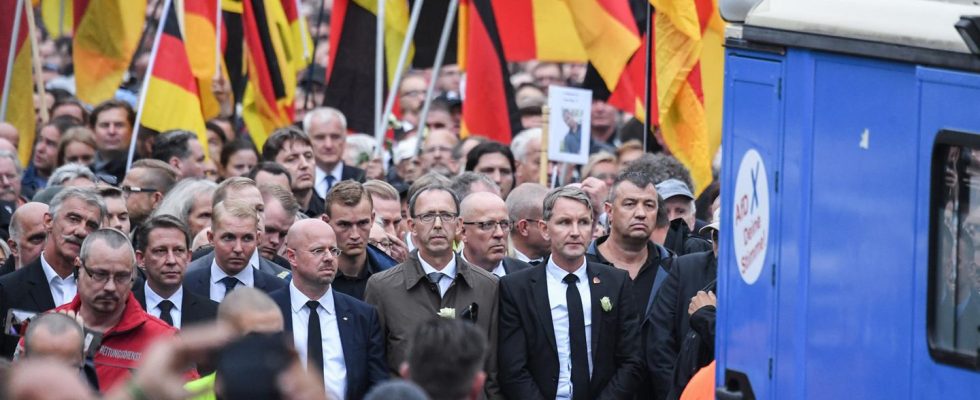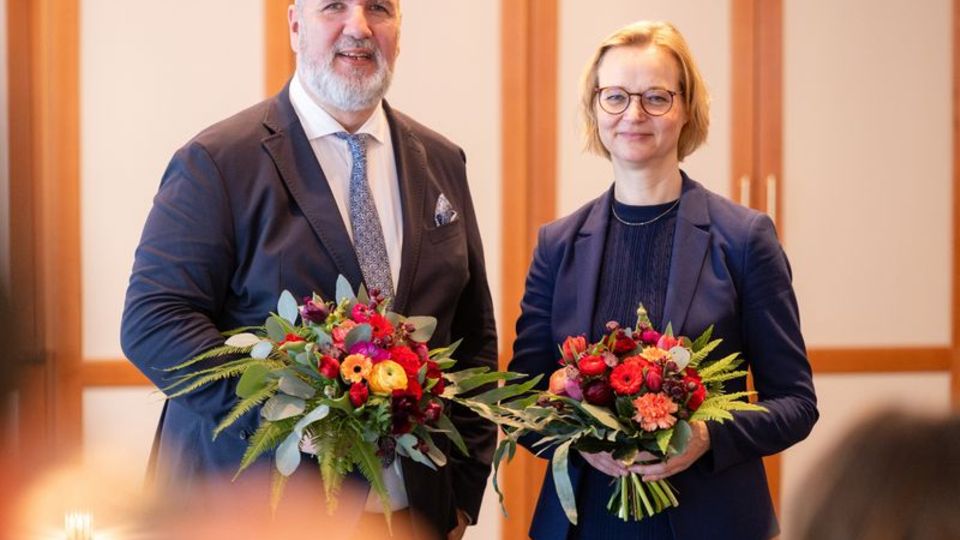In the West there is fear of the elections in the East, especially in Thuringia. The situation there is also based on Western ignorance and the consequences of a systematic exchange of elites.
This text is largely based on an excerpt from the newly published book by reporter Martin Debes: “Germany of Extremes. How Thuringia challenges democracy.” Ch. Links Verlag, 278 pages, 20 euros.
In September of this year, the Federal Republic of Germany’s democracy will probably face its biggest acid test to date. In the so-called “Eastern elections”, the AfD could become the strongest force and possibly even take power.
From West Germany, this precarious situation is mostly viewed with incomprehension, if not contempt. Why, people ask, do the Ossis always have to cause trouble?
© Ch. Links Verlag
But in order to find answers to this, precise considerations are necessary instead of blanket judgments. This begins with the almost thoughtless term “Eastern elections”. East Germany is not a homogeneous area. It is also not just an accession area and certainly not a “former GDR”. The three countries in question – Saxony, Thuringia and Brandenburg – are quite different in their long history and political constellation. What unites them, however, is the shared experience of real socialist dictatorship and turbo-capitalist transformation.
This is the only way to explain the special case of Thuringia, in which the only Prime Minister of the Left, Bodo Ramelow, faces Björn Höcke, one of the most extreme and influential AfD politicians – and in which the CDU is once again in danger of to be crushed between both poles. There is a high probability that after the election there will only be enough for an unstable minority government.
There is no getting around the consequences of the years of change
This self-blockade doesn’t just have to do with those involved in Erfurt. The temporary strength of the PDS, later the Left, as well as the current momentum of the AfD is due to decisions in Bonn and later in Berlin. As little as the East Germans were involved in the administration of reunification, they remain underrepresented to this day. Ramelow, for example, comes from Lower Saxony, Höcke from North Rhine-Westphalia. Most of the other top candidates for the Thuringian parliament were also born in the old Federal Republic.
This is not a coincidence, but rather a system, as a look at history shows.
Everything formally began on October 3, 1990 with the accession of the so-called new states to the federal territory in accordance with Article 23 of the Basic Law: Almost overnight, the area that was called the GDR for 40 years became part of the legal, social and economic system of the West – including it Institutions, not a single one of which is in the East. The Bundestag, Federal Government and Bundesrat sit in Bonn. The Federal Constitutional Court is located in Karlsruhe, the Bundesbank in Frankfurt am Main. All federal authorities also operate from West Germany.
At the same time, an exchange of elites begins, for which there is no example in history. Whether in ministerial administrations and large companies, in courts and public prosecutors, in newspaper publishers and on the radio, in universities and colleges: the staff of the larger, richer and more successful part of Germany takes over the leadership of the smaller part. And it stays that way.

Author Martin Debes
© Sascha Fromm
Almost a quarter of a century later, just eight of the 33 department heads in the Thuringian ministries are native East Germans.After more than thirty years, only half of the top staff in the ministries and subordinate authorities come from East Germany. In the justice sector it is currently just under a quarter.
At the same time, the Federal Republic was pumping billions upon billions of German marks into banks, companies and social security funds in the accession area. By 2020, 1.6 trillion euros will be transferred from West to East. In addition, the East receives many billions from European structural and social funds, most of which come from the budget of the EU member state Germany. West Germans expect gratitude for the donations and help. Only a few reflect on their privileged situation. Their respect for the East is limited to the legend of the peaceful revolution and often has an audibly paternalistic note.
The reunification marks the beginning of a mutual misunderstanding. Because most East Germans appreciate the new freedoms. They enjoy the advantages of the rule of law, the opening to the world, the increase in consumption and prosperity. And yes, they are grateful for it.
For many, the turnaround was also a losing proposition
But what many also have to experience is the loss of their job and – more importantly – their previous status. They had a respected profession, were a brigadier, midwife, engineer, functionary, lecturer, skilled worker or executive secretary with a secure living. Now they have to retrain, commute to the West or move to maintain their very existence. They experience that their qualifications are not recognized or are only partially recognized and that they are under general suspicion as suspected followers.
On the other hand, there is the ignorance of many West Germans who dismiss talk of devaluation and discrimination as whining. Many people don’t even know that the solidarity surcharge introduced in 1991 is not transferred directly to the East, but is first absorbed into the overall federal budget – and that the contribution must of course also be paid by all East German taxpayers.
Meanwhile, how much the West will benefit from unification is hardly discussed. The Federal Republic overcomes its crippling recession in 1990 because an almost insatiable sales market emerges in the East. The new German citizens spend most of their D‑Mark on Western products, such as cars, refrigerators, television sets, building materials and food. While the East slides into economic crisis, the reunification boom begins in the West. In addition, the gaps in the labor market are being filled with well-trained and highly motivated specialists from the East. You work for starting salaries in industry, crafts or the service sector.
The East German migration loss
In 1989 and 1990 alone, around 800,000 people moved from the GDR to the West. It is primarily the young, educated and mobile part that matters. In total, around 3,680,000 people left East Germany for the West in the first three decades after 1990. 2,450,000 West Germans moved in the opposite direction, many of whom took on leading positions in politics, administration and business. They tend to settle in urban rather than rural regions. The bottom line is that the East German migration loss amounts to a good 1.2 million people. In Thuringia there are 310,000.
Not only are many young women going west: the number of births per woman halves within a few years. Agricultural cooperatives that were formed from the LPG go bankrupt. The Treuhand splits up, privatizes or closes the former combines and VEB in piecework.
In 1990, the year of unification, the number of employed people in East Germany fell by 1.6 million or 18 percent. The decline is highest in Thuringia at 21 percent. On average in 1991, around 150,000 unemployed people were registered in the country. But the numbers mask the depth of the cut. In addition to the unemployed, around 80,000 people are in job creation measures, and another 167,000 have had to start further training.
“There has to be blood sometimes”
“In the East German economy, people sometimes have to die,” said the State Secretary in the Federal Ministry of Finance, Horst Köhler, at the beginning of 1991, who would later, as Federal President, often extol the virtues of unity. “Blood has to flow sometimes.” In Thuringia it looks like this: The Eisenach Wartburg-Werke is laying off 5,000 of its 7,000 employees. Robotron Sömmerda is cutting half of its 13,000 employees. At Carl Zeiss, 15,000 people become unemployed.
The final impact was politically delayed. On July 1, 1991, both the collectively agreed protection against dismissal for employees of former GDR companies and the waiting period for former state employees set out in the unification agreement expired. The deadline also automatically means the end for all short-time workers, who are now set to “zero hours”. The employment offices will now be overflowing at the latest.
New small and micro companies are emerging primarily in the trade and service sectors. But here too, it is mainly West German chains that are opening supermarkets or branches and taking over or displacing the old consumer and luxury stores.
East German society is divided into winners and losers. Mobile, younger East Germans with a hardly compromised past and a Western-compatible education have the best opportunities – and often take advantage of them. People over the age of 50 who have worked in a VEB for decades, may have been in the SED and cannot easily change location have significantly fewer options. They are also not in demand on the West German labor market.
The feeling of disappointment will linger for a long time
The winning and losing stories will be passed on to the next generations. Children experience the unemployment of their mother and father as their own trauma. After years of dictatorship, indoctrination and deprivation, a time of uncertainty now begins for many young people, with moves, constantly changing lesson plans and teachers – and parents who are busy adjusting to the new times. It’s not just in schools that there is anarchy that leads to violence and exclusion.
The collective feeling of disappointment will last for a long time – and continues to have an impact today. Anyone wondering why the Ossis is still causing trouble could find an answer here.
The book will be presented on April 17th at 6 p.m. in the Berlin state representation of Thuringia at Mohrenstraße 64. stern chief reporter Miriam Hollstein moderated.



